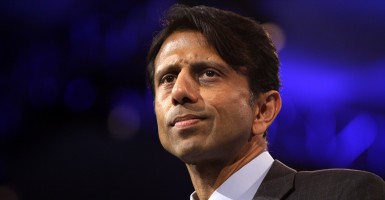In a move that surprised some conservative allies, Louisiana Gov. Bobby Jindal recently vetoed legislation authorizing the state to implement the federal REAL ID Act.
The Republican governor called the measure “unnecessary federal oversight of our driver’s licenses,” although advocates say they are concerned Jindal doesn’t fully appreciate the benefits of the anti-terrorism measure.
Congress passed the REAL ID Act in 2005 after the 9/11 Commission concluded that “for terrorists, travel documents are as important as weapons.” Supporters say it provides a common sense solution to preventing terrorist travel and identity fraud.
>>> REAL ID Delays Hurt Homeland Security
The 9/11 Commission found that 18 airline hijackers on Sept. 11, 2001, had a total of 30 driver’s licenses or state IDs among them, six of which were used to board planes that day. REAL ID aimed to prevent such a situation from happening again by establishing national standards for official identification cards.
Louisiana and 12 other states ruled noncompliant by the Department of Homeland Security (DHS) were required to implement REAL ID by January 2016 to ensure access for their residents on domestic commercial flights. Otherwise, citizens will be required to use a federal ID such as a passport to enter a federal facility or board a domestic airplane.
Currently, Homeland Security recognizes 20 states as compliant, but an additional 24 have received an extension based on their commitment to meeting the federal standards.
Of his decision to veto the REAL ID Act, Jindal said:
The Eagle Forum, the Louisiana Family Forum, and [the] Tea Party of Louisiana have asked for a veto of the bill due to concerns about whether it will compromise Louisiana’s sovereignty over what is fundamentally a state method of identification.
>>> Nearly Half of All States Now Deemed Compliant With REAL ID
Jindal’s veto was a disappointment for David Inserra, a research associate for homeland and cyber security at The Heritage Foundation.
“It’s unfortunate because this program helps cut down on terrorism, crimes, and other forms of fraud, which helps the taxpayers of all 50 states,” Inserra said. “States don’t have to participate. REAL ID is simply saying if you want to use something that the federal government is responsible for defending—like a federal facility or a plane—you must meet certain federal standards.”
>>> Small Steps Forward for REAL ID
In addition to fighting fraud and terrorism, REAL ID has the potential to curtail America’s illegal immigration problem, which Jindal has staunchly supported. Inserra said:
One of the standards of REAL ID is that motor vehicle associations are to verify a non-citizen’s lawful status through DHS’s Systematic Alien Verification for Entitlements system before issuing an ID, obviously helping states identify someone who is here illegally and ineligible for an ID. States can only issue REAL ID compliant licenses after receiving valid documentation that proves citizenship or lawful status, as well as other things including a Social Security number and proof of residence.
Mike Reed , Jindal’s communications director, told The Daily Signal that the illegal immigration factor is a “moot point” in the Bayou State:
Louisiana already has high quality security on its licenses without the federal government controlling it. In fact, many of the security features of REAL ID are already established in Louisiana as we have rigorous safeguards in place to verify the status of individuals seeking a Louisiana identification.
But if Louisiana already follows the majority of the DHS security standards, Inserra argued, why not go all the way?
Gene Mills, president of the Louisiana Family Forum—one of the driving forces behind Jindal’s veto—told The Daily Signal the group objected to REAL ID because it constituted an unfunded mandate, threatened privacy, and did not include a clean opt-out provision.
“The [opt-out] option available under the act would only be extended to renewals, and not new licensees,” Mills said. “If my 13-year-old daughter didn’t want REAL ID, she wouldn’t have the option to opt out.”
Citing a 2012 analysis by The Heritage Foundation, Inserra said these concerns largely are based on myths and misinterpretations:
The beauty of REAL ID is it gives states flexibility in how they want to implement it. If a state wants to allow its citizens to choose between a REAL ID-compliant ID and a non-compliant ID, that’s up to each state. I think that allowing individuals to pick those less secure IDs reduces the fraud prevention benefits to the state, but it still ensures that only those with secure IDs are allowed to access federally protected locations.
Also, Inserra said, REAL ID can’t be an “unfunded mandate” because it is a voluntary program.
So far, implementing REAL ID has cost far less than predicted. In Maryland, he said, implementation was estimated to cost $150 million. The program ended up costing $4.5 million, half of which was covered by DHS grants.
“This doesn’t even consider the money saved by reducing fraud in the state,” Inserra said, making the case for every state to embrace the federal security standards.
“I hope Gov. Jindal will come to see the real security and crime prevention benefits of REAL ID,” he said.

























